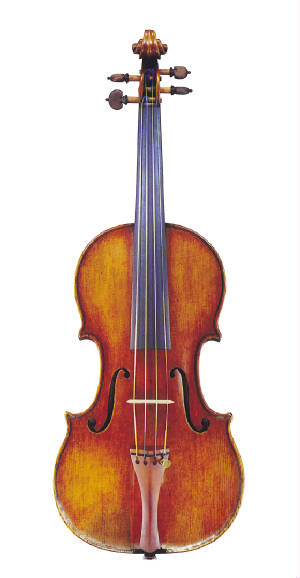The whole point of practicing is to improve. You should always know what you want to accomplish
before starting your practice session. A good way to organize your thoughts is to have a set of goals. You can
have an overall goal such as becoming a professional orchestral violinist, or learning enough Irish fiddle tunes to play in
the sessions at your local pub. Then you need to have a medium-range goal, such as learning vibrato by the
end of the year. After that, aim for a weekly goal, like improving your straight bowing. Finally, have a
daily goal, such as fixing a slipping bow hand, or memorizing a page of music. The daily goal is the primary thing to
concentrate on during the session, but you should also work on the weekly goal. Goals give you a target that
you can aim toward, giving you direction.
I used to write my daily goal on a piece
of paper and tape it to my music stand. This would focus my attention, and remind me every time I saw it. It's
very hard to multi-task while learning something new and my attention would always drift to other things, but the note
on my music stand would bring me back, over and over. Concentrate on one thing and do it correctly enough times to start
making it a habit. There is a Japanese saying that translates into "keep one point," or, only think about
one thing at a time. Suzuki used to say that knowledge is not skill, knowledge plus 10,000 repetitions creates skill,
or automatic execution.
As for fixing difficult passages in your music, Carl Flesh used
to ask students to play through a work, paying special attention to the difficult spots (but not stopping), then to go back
and work on those spots in great detail. Then, after performing breathing exercises (for relaxation), to play through
the work again to see if the difficult passages had improved.
How much each day should
you practice? It depends on your ambitions, school/job/family requirements and energy level. The most important
thing is to do some practice EVERY DAY. Suzuki used to tell his students to practice only on the days they eat.
Practicing six hours on Saturday will not make up for five missed days of study. For a violinist wishing to become a
professional classical artist, Leopold Auer (Heifetz's teacher) wrote that if a student needed more than three hours
a day to complete their violin studies, they should do something else! However, Ivan Galamian
used to ask students at the Meadowmount school to practice for 50 minutes, followed by 10 minutes of rest, repeated from
8:00 a.m. until 12:00 noon, then again from 1:00 - 1:50. Resting each hour allows you to return to your practice
with more focus and stamina. I'd like to add that it's very risky to start practicing that much all at
once. You must work up to it slowly. If you've read My Purpose page, you'll
know about the injury I sustained from over-use. You need to think of yourself as an athlete! Plan time to
stretch before and after you practice. Warm up slowly, do not just 'jump in'. If something hurts, pay
attention to your body because it's telling you something important. Everyone has heard the saying no pain,
no gain, but I say no pain, no pain. Work smarter, not just harder. If you injure yourself and don't
let it heal properly, it can become chronic and actually end your career.
I'll finish by
saying that the power of positive thinking is an incredible practice tool. If you do not believe you can achieve
something, if you can't visualize yourself succeeding, you will not succeed. If you have a low self esteem this
can be a problem. If you can identify that self esteem is a problem for you, one of your goals to should be
to improve it. How can this be done??? First of all, remember that you cannot be perfect. You
should aim for your personal best, not something that is impossible. Remember that you are unique! One of
a kind. Instead of looking at the things you dislike about yourself (or can't do), consider all the things you can
do, even if it's something you think is simple or unimportant. There's a good chance the same thing
would be difficult for someone else. Also, start telling yourself "good job" when you do something correctly. Train
your thinking patterns to become positive. It takes a lot of discipline to shut out the negative thoughts, but it can
be done.
